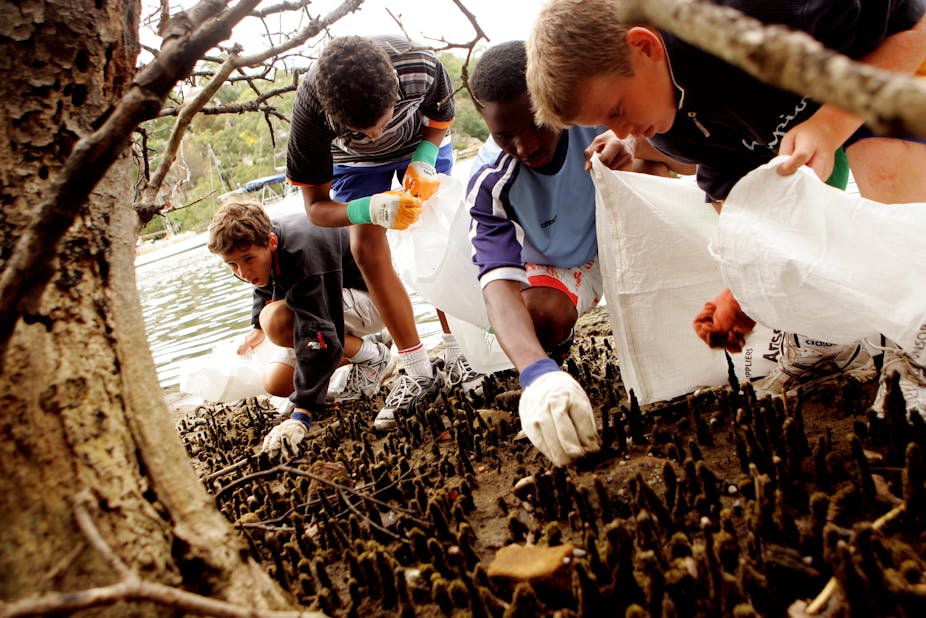GREENHOUSE 2011 - People’s belief or scepticism when it comes to climate change may not be as important as we think. What matters is how we behave.
A lot of fuss has been made about whether people believe in climate change. Is it happening or not? If it is, what part have we humans played?
It’s important to make a lot of fuss about this. But by worrying about people’s beliefs and attitudes about climate change, it’s easy to overlook other critical questions.
What are we doing about it (not much would appear to be the answer - aside from the proposed carbon tax perhaps), and why are we doing that (or why not)?
The CSIRO conducted a national survey of just over 5,000 people last year. We asked people whether they engaged in a series of different carbon-relevant behaviours, and if they did, why they did so.
Was it mostly for environmental reasons, or mostly for other reasons? The results are summarised in the graph below.

What do we do to help the environment, and why?
The graph tells us many things. Some environmentally-friendly activities are commonly done; others are almost never done. And people have a variety of reasons for engaging in carbon-relevant behaviours.
People recycle household waste and switch to environmentally-friendly products for environmental reasons.
But buying locally-made products and trying to fix things rather than replacing them are done mostly for non-environmental reasons.
How many of these behaviours people do is not closely tied to gender, age, income or education. But they are tied to voting intentions (the survey was done in the weeks leading up to the 2010 federal election).
People who intended to vote for the ALP or the Greens reported doing more carbon-relevant behaviours than those who intended to vote for the Coalition or for an independent candidate.
Do our beliefs matter?
People’s beliefs about climate change (is it happening? are we largely to blame?) are associated with their carbon-related behaviours, but not strongly.
People who believe in climate change engage in more carbon-relevant behaviour. But importantly, perhaps even oddly, these behaviours are not always done for environmental reasons.
This complicated interplay between beliefs, motivations, values and behaviours makes life both interesting and difficult.
If we want to change behaviour in our community, we cannot just rely on changing people’s beliefs or motivations.
Even if everyone accepted human-induced climate change, we would not necessarily see a big increase in people doing the ‘right thing’.
An alternative is to focus on the behaviours themselves, and on the whole range of reasons why people engage in them.
We can guess that these reasons are related to money, status, habit, complying with prevailing norms, and probably a big bunch of other possibilities too. But these are hypotheses only, and need to be tested.
Changing our behaviour - the pragmatic approach
Appealing to a range of motivations has some practical benefits.
We could avoid identity-laden debates about climate change, and gloom-and-doom messages, which can lead to counter-productive responses and ‘climate change fatigue’.
A more diverse set of people would engage in environmentally-friendly behaviour, establishing new social norms. Once a behaviour becomes standard, it will become a habit and persist beyond its original motivation.
Some people have argued against this sort of pragmatic orientation in favour of a values-focused approach. They argue that appealing to a range of motivations is dangerous, as it reinforces a set of values that ultimately is unsustainable.
It reproduces the importance of individualistic and materialistic values instead of trying to replace them with communitarian and ecological values.
There is merit to this argument, but shifting a culture’s dominant ideology is no easy feat, and cannot be achieved quickly.
The onset of climate change means we must change the way we live. Changing society’s dominant ideology, and its behavioural manifestations, is a noble and lofty goal.
But there are more immediate and pragmatic goals, that rely on a smorgasbord approach to producing widespread change.
Our nation needs to implement a suite of responses to climate change, and quickly. The proposed carbon tax is one such response, driven nationally and top-down.
We also need to change the day-to-day behaviours of individuals and households. Changing individuals’ beliefs about climate change will probably not produce much in the way of behaviour change. We have to address a whole range of reasons why people do what they do.
Of course, it is fair to ask what our motivations are in doing this research, and why we are doing what we are. For environmental reasons, naturally, and for personal reasons, and for moral reasons, and…

